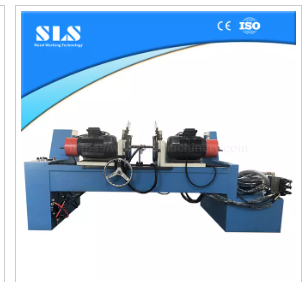The Essentials of Steel Pipe Rolling Technology
Steel pipe rolling machines stand as a cornerstone in the manufacturing and construction sectors, transforming steel tubes into specific curves and diameters needed for various applications. These machines employ a robust set of rollers to exert pressure and deform steel pipes into desired shapes without compromising the metal's integrity.
Core Mechanics: Pressure and Precision
At the heart of a steel pipe rolling machine are typically three to five rollers arranged in a triangular or pyramid formation. This configuration allows for even distribution of force, which is crucial for achieving smooth, uniform bends. The central roller exerts a downward force while the two side rollers provide support and directional guidance, ensuring the bend's accuracy and consistency.
Adjustability for Various Pipe Sizes
A key feature of these machines is their adaptability to different pipe diameters and wall thicknesses. Roller positions can be manually or automatically adjusted, providing flexibility for handling steel pipes ranging from small diameter tubes up to large industrial pipes. This versatility is essential for manufacturers who work with a broad spectrum of pipe specifications.
Speed and Efficiency in Operation
Speed settings on a steel pipe rolling machine can significantly influence productivity. Modern machines are equipped with variable speed controls, allowing operators to adjust the bending speed based on the thickness of the metal and the complexity of the bend. This capability ensures that each bend is executed with precision, minimizing the risk of defects.
Safety Features: Ensuring Operator Security
Safety in operation is paramount. These machines are designed with built-in safety features, including emergency stop buttons, protective barriers, and automatic shutdown mechanisms that activate if a malfunction is detected. These safety features protect operators from potential injuries and ensure the machine operates within safe parameters.

Application Across Industries
The applications for steel pipe rolling machines are vast and varied. They are essential in the fabrication of structural frames, automotive components, and even artistic installations. Each application benefits from the machine’s ability to produce tight-radius bends and complex shapes, which are often required in bespoke designs and high-spec engineering projects.
Explore More about Steel Pipe Rolling Machines
For a deeper dive into the capabilities and specifications of a steel pipe rolling machine, click the link.
Advanced Technology Integration
Many modern steel pipe rolling machines integrate advanced technology such as CNC (Computer Numerical Control) systems. This technology allows for precise programming of bend parameters, ensuring each bend is consistent with the last. CNC systems not only increase the accuracy but also significantly reduce the time involved in setup and operation.
Tailoring to Specific Needs
To accommodate specific project requirements, many machines also offer customization options such as multi-axis bending capabilities, which allow for more complex bends and shapes. These enhancements make the steel pipe rolling machine an indispensable tool in today’s manufacturing landscape.
The operational prowess of steel pipe rolling machines is fundamental to industries that demand precision and reliability in their metal forming processes. Their robust design coupled with advanced technological features ensures that they can meet the diverse needs of modern manufacturing and construction projects. Whether bending small conduits or large structural pipes, these machines are up to the task, providing dependable and efficient service.